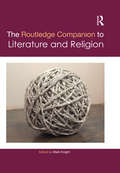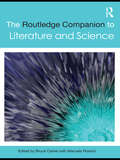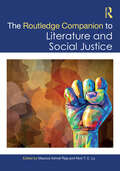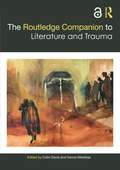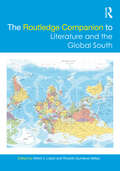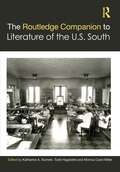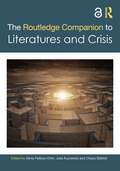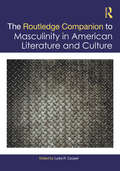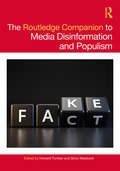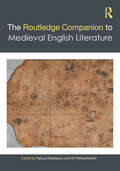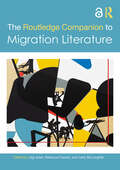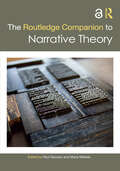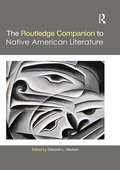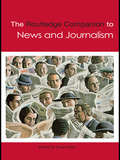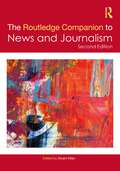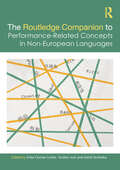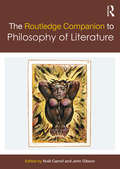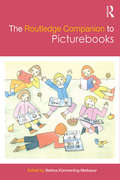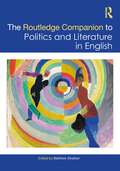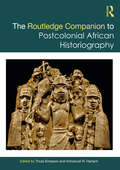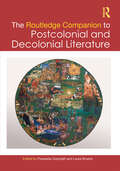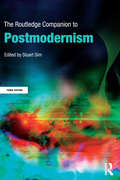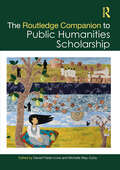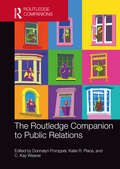- Table View
- List View
The Routledge Companion to Literature and Religion (Routledge Literature Companions)
by Mark KnightThis unique and comprehensive volume looks at the study of literature and religion from a contemporary critical perspective. Including discussion of global literature and world religions, this Companion looks at: Key moments in the story of religion and literary studies from Matthew Arnold through to the impact of 9/11 A variety of theoretical approaches to the study of religion and literature Different ways that religion and literature are connected from overtly religious writing, to subtle religious readings Analysis of key sacred texts and the way they have been studied, re-written, and questioned by literature Political implications of work on religion and literature Thoroughly introduced and contextualised, this volume is an engaging introduction to this huge and complex field.
The Routledge Companion to Literature and Science (Routledge Literature Companions)
by Bruce ClarkeWith forty-four newly commissioned articles from an international cast of leading scholars, The Routledge Companion to Literature and Science traces the network of connections among literature, science, technology, mathematics, and medicine. Divided into three main sections, this volume: links diverse literatures to scientific disciplines from Artificial Intelligence to Thermodynamics surveys current theoretical and disciplinary approaches from Animal Studies to Semiotics traces the history and culture of literature and science from Greece and Rome to Postmodernism. Ranging from classical origins and modern revolutions to current developments in cultural science studies and the posthumanities, this indispensible volume offers a comprehensive resource for undergraduates, postgraduates, and researchers. With authoritative, accessible, and succinct treatments of the sciences in their literary dimensions and cultural frameworks, here is the essential guide to this vibrant area of study.
The Routledge Companion to Literature and Social Justice (Routledge Literature Companions)
by Masood Ashraf Raja Lu, Nick T. C.The Routledge Companion to Literature and Social Justice is a comprehensive and multi- purpose collection on this important topic. With contributors working in various fields, the Companion provides in- depth analyses of both the cumulative and emergent issues, obstacles, praxes, propositions, and theories of social justice. The first section offers a historical overview of major developments and debates in the field, while the following sections look in more detail at the key traditions and show how literature and theory can be applied as analytical tools to real- world inequalities and the impact of doing so. The contributors provide reviews of major theoretical traditions, including Marxism, feminism, Critical Race Theory, disability studies, and queer studies. They also share literary analyses of influential authors including W. E. B. Du Bois, Yang Kui, Edwidge Danticat, Octavia Butler, and Rivers Solomon amongst others. The final section considers future possibilities for theory and action of justice, drawing specifically from theories and knowledges in decolonial, Indigenous, environmental, and posthumanist studies. This authoritative volume draws on the intersections between literary studies and social movements in order to provide scholars, students, and activists alike with a complete collection of the most up- to- date information on both canonical and emerging texts and case studies globally.
The Routledge Companion to Literature and Trauma (Routledge Literature Companions)
by Colin DavisLiterary trauma studies is a rapidly developing field which examines how literature deals with the personal and cultural aspects of trauma and engages with such historical and current phenomena as the Holocaust and other genocides, 9/11, climate catastrophe or the still unsettled legacy of colonialism. The Routledge Companion to Literature and Trauma is a comprehensive guide to the history and theory of trauma studies, including key concepts, consideration of critical perspectives and discussion of future developments. It also explores different genres and media, such as poetry, life-writing, graphic narratives, photography and post-apocalyptic fiction, and analyses how literature engages with particular traumatic situations and events, such as the Holocaust, the Occupation of France, the Rwandan genocide, Hurricane Katrina and transgenerational nuclear trauma. Forty essays from top thinkers in the field demonstrate the range and vitality of trauma studies as it has been used to further the understanding of literature and other cultural forms across the world.
The Routledge Companion to Literature and the Global South (Routledge Literature Companions)
by Alfred J. López and Ricardo Quintana-VallejoThe Routledge Companion Literature and the Global South offers a comprehensive overview of the field at a key moment in its development—a snapshot of where Global South literary studies stands in its second decade. As the aftermath of a string of global cataclysms since the rise of neoliberal globalization has demonstrated, it is the poor, the disenfranchised, and the marginalized who consistently bear the brunt of the suffering. What defines the Global South is the recognition across the world that globalization’s promised bounties have not materialized. It has failed as a global master narrative. Global South studies centers on three general areas: Globalization, its aftermath/failure, and how those on the economic bottom survive it. Organized into three parts, this volume consists of original essays by 25 contributors from around the world. Part I focuses on the origins and objects of Global South studies, and how this field has come to define and historicize its organizing concept. Part II considers subsequent critical developments in Global South studies, particularly those that embrace interdisciplinary and transdisciplinary approaches. Part III features case studies which highlight a range of applications and interventions. The contributors critique the boundaries and definitions explored in the earlier parts and push "settled" literatures or methods into new analytical spaces. This innovative collection is an invaluable resource for anyone studying and researching Global South studies and literature, but also those interested in world literature, contemporary literature, postcolonialism, decolonizing the curriculum, critical race studies, gender studies, and politics.
The Routledge Companion to Literature of the U.S. South (Routledge Literature Companions)
by Katharine A. BurnettThe Routledge Companion to Literature of the U.S. South provides a collection of vibrant and multidisciplinary essays by scholars from a wide range of backgrounds working in the field of U.S. southern literary studies. With topics ranging from American studies, African American studies, transatlantic or global studies, multiethnic studies, immigration studies, and gender studies, this volume presents a multi-faceted conversation around a wide variety of subjects in U.S. southern literary studies. The Companion will offer a comprehensive overview of the southern literary studies field, including a chronological history from the U.S. colonial era to the present day and theoretical touchstones, while also introducing new methods of reconceiving region and the U.S. South as inherently interdisciplinary and multi-dimensional. The volume will therefore be an invaluable tool for instructors, scholars, students, and members of the general public who are interested in exploring the field further but will also suggest new methods of engaging with regional studies, American studies, American literary studies, and cultural studies.
The Routledge Companion to Literatures and Crisis (Routledge Literature Companions)
by Silvia Pellicer-Ortín Julia Kuznetski Chiara BattistiThe Routledge Companion to Literatures and Crisis provides deep insight into a complex and multi-layered phenomenon. The third decade of the twenty-first century is being marked by a polycrisis caused by various world crises, such as the COVID-19 pandemic, armed conflicts and climate change leading to economic, geopolitical, environmental, health and security crises.Featuring 42 chapters, the collection examines crises through literary texts in relation to the environment, finance, migration and diaspora, war, human rights, values and identity, health, politics, terrorism and technology. It illuminates the many faces of the current permacrisis as well as the multifarious crises of the past and their representation in literatures across ages and cultures—from the Viking wars, Black Death in mediaeval Europe, technology in ancient China and the crisis of power in Elizabethan England to imperial biopower in nineteenth-century India, the genocides in the twentieth century, upsurge of domestic violence during the Covid lockdown in Spain and the development of AI.The Companion connects diverse cultures, disciplines and academic traditions to show how and why literature, media and art can voice all types of crises across times. It will be a key resource for students and researchers in a broad range of areas including literature, film studies, narrative studies, cultural studies, international politics and ecocriticism.Chapters: Chapter 6 of this book is freely available as a downloadable Open Access PDF at http://www.taylorfrancis.com under a Creative Commons Attribution (CC-BY) 4.0 license.
The Routledge Companion to Masculinity in American Literature and Culture
by Lydia R. CooperRecently, the U.S. has seen a rise in misogynistic and race-based violence perpetrated by men expressing a sense of grievance, from "incels" to alt-right activists. Grounding sociological, historical, political, and economic analyses of masculinity through the lens of cultural narratives in many forms and expressions, The Routledge Companion to Masculinity in American Literature and Culture suggests that how we examine the stories that shape us in turn shapes our understanding of our current reality and gives us language for imagining better futures. Masculinity is more than a description of traits associated with particular performances of gender. It is more than a study of gender and social power. It is an examination of the ways in which gender affects our capacity to engage ethically with each other in complex human societies. This volume offers essays from a range of established, global experts in American masculinity as well as new and upcoming scholars in order to explore not just what masculinity once meant, has come to mean, and may mean in the future in the U.S.; it also articulates what is at stake with our conceptions of masculinity.
The Routledge Companion to Media Disinformation and Populism (Routledge Media and Cultural Studies Companions)
by Silvio Waisbord Howard TumberThis companion brings together a diverse set of concepts used to analyse dimensions of media disinformation and populism globally. The Routledge Companion to Media Disinformation and Populism explores how recent transformations in the architecture of public communication and particular attributes of the digital media ecology are conducive to the kind of polarised, anti-rational, post-fact, post-truth communication championed by populism. It is both interdisciplinary and multidisciplinary, consisting of contributions from both leading and emerging scholars analysing aspects of misinformation, disinformation, and populism across countries, political systems, and media systems. A global, comparative approach to the study of misinformation and populism is important in identifying common elements and characteristics, and these individual chapters cover a wide range of topics and themes, including fake news, mediatisation, propaganda, alternative media, immigration, science, and law-making, to name a few. This companion is a key resource for academics, researchers, and policymakers as well as undergraduate and postgraduate students in the fields of political communication, journalism, law, sociology, cultural studies, international politics and international relations.
The Routledge Companion to Medieval English Literature (Routledge Literature Companions)
by Edited by Raluca Radulescu and Sif RikhardsdottirThe Routledge Companion to Medieval English Literature offers a new, inclusive, and comprehensive context to the study of medieval literature written in the English language from the Norman Conquest to the end of the Middle Ages. Utilising a Trans-European context, this volume includes essays from leading academics in the field across linguistic and geographic divides. Extending beyond the traditional scholarly discussions of insularity in relation to Middle English literature and ‘isolationism’, this volume: Oversees a variety of genres and topics, including cultural identity, insular borders, linguistic interactions, literary gateways, Middle English texts and traditions, and modern interpretations such as race, gender studies, ecocriticism, and postcolonialism. Draws on the combined extensive experience of teaching and research in medieval English and comparative literature within and outside of anglophone higher education and looks to the future of this fast-paced area of literary culture. Contains an indispensable section on theoretical approaches to the study of literary texts. This Companion provides the reader with practical insights into the methods and approaches that can be applied to medieval literature and serves as an important reference work for upper-level students and researchers working on English literature.
The Routledge Companion to Migration Literature (Routledge Literature Companions)
by Rebecca Fasselt Gigi Adair Carly McLaughlinThe Routledge Companion to Migration Literature offers a comprehensive survey of an increasingly important field. It demonstrates the influence of the “age of migration” on literature and showcases the role of literature in shaping socio-political debates and creating knowledge about the migratory trajectories, lives, and experiences that have shaped the post-1989 world.The contributors examine a broad range of literary texts and critical approaches that cover the spectrum between voluntary and forced migration. In doing so, they reflect the shift in recent years from the author-centric study of migrant writing to a more inclusive conception of migration literature. The book contains sections on key terms and critical approaches in the field; important genres of migration literature; a range of forms and trajectories of migration, with a particular focus on the global South; and on migration literature’s relevance in social contexts outside the academy. Its range of scholarly voices on literature from different geographical contexts and in different languages is central to its call for and contribution to a pluriversal turn in literary migration studies in future scholarship.This Companion will be of particular interest to scholars working on contemporary migration literature, and it also offers an introduction to new students and scholars from other fields.Chapter 15 of this book is freely available as a downloadable Open Access PDF at http://www.taylorfrancis.com under a Creative Commons [Attribution-Non Commercial-No Derivatives (CC-BY-NC-ND)] 4.0 license.
The Routledge Companion to Narrative Theory (Routledge Literature Companions)
by Paul Dawson Maria MäkeläThe Routledge Companion to Narrative Theory brings together top scholars in the field to explore the significance of narrative to pressing social, cultural, and theoretical issues. How does narrative both inform and limit the way we think today? From conspiracy theories and social media movements to racial politics and climate change future scenarios, the reach is broad. This volume is distinctive for addressing the complicated relations between the interdisciplinary narrative turn in the academy and the contemporary boom of instrumental storytelling in the public sphere. The scholars collected here explore new theories of causality, experientiality, and fictionality; challenge normative modes of storytelling; and offer polemical accounts of narrative fiction, nonfiction, and video games. Drawing upon the latest research in areas from cognitive sciences to complexity theory, the volume provides an accessible entry point for those new to the myriad applications of narrative theory and a point of departure for new scholarship.
The Routledge Companion to Narrative Theory (Routledge Literature Companions)
by Paul DawsonThe Routledge Companion to Narrative Theory brings together top scholars in the field to explore the significance of narrative to pressing social, cultural, and theoretical issues. How does narrative both inform and limit the way we think today? From conspiracy theories and social media movements to racial politics and climate change future scenarios, the reach is broad. This volume is distinctive for addressing the complicated relations between the interdisciplinary narrative turn in the academy and the contemporary boom of instrumental storytelling in the public sphere. The scholars collected here explore new theories of causality, experientiality, and fictionality; challenge normative modes of storytelling; and offer polemical accounts of narrative fiction, nonfiction, and video games. Drawing upon the latest research in areas from cognitive sciences to complexity theory, the volume provides an accessible entry point for those new to the myriad applications of narrative theory and a point of departure for new scholarship.
The Routledge Companion to Native American Literature (Routledge Literature Companions)
by Deborah L. MadsenThe Routledge Companion to Native American Literature engages the multiple scenes of tension — historical, political, cultural, and aesthetic — that constitutes a problematic legacy in terms of community identity, ethnicity, gender and sexuality, language, and sovereignty in the study of Native American literature. This important and timely addition to the field provides context for issues that enter into Native American literary texts through allusions, references, and language use. The volume presents over forty essays by leading and emerging international scholars and analyses: regional, cultural, racial and sexual identities in Native American literature key historical moments from the earliest period of colonial contact to the present worldviews in relation to issues such as health, spirituality, animals, and physical environments traditions of cultural creation that are key to understanding the styles, allusions, and language of Native American Literature the impact of differing literary forms of Native American literature. This collection provides a map of the critical issues central to the discipline, as well as uncovering new perspectives and new directions for the development of the field. It supports academic study and also assists general readers who require a comprehensive yet manageable introduction to the contexts essential to approaching Native American Literature. It is essential reading for anyone interested in the past, present and future of this literary culture. Contributors: Joseph Bauerkemper, Susan Bernardin, Susan Berry Brill de Ramírez, Kirby Brown, David J. Carlson, Cari M. Carpenter, Eric Cheyfitz, Tova Cooper, Alicia Cox, Birgit Däwes, Janet Fiskio, Earl E. Fitz, John Gamber, Kathryn N. Gray, Sarah Henzi, Susannah Hopson, Hsinya Huang, Brian K. Hudson, Bruce E. Johansen, Judit Ágnes Kádár, Amelia V. Katanski, Susan Kollin, Chris LaLonde, A. Robert Lee, Iping Liang, Drew Lopenzina, Brandy Nālani McDougall, Deborah Madsen, Diveena Seshetta Marcus, Sabine N. Meyer, Carol Miller, David L. Moore, Birgit Brander Rasmussen, Mark Rifkin, Kenneth M. Roemer, Oliver Scheiding, Lee Schweninger, Stephanie A. Sellers, Kathryn W. Shanley, Leah Sneider, David Stirrup, Theodore C. Van Alst, Jr., Tammy Wahpeconiah
The Routledge Companion to News and Journalism (Routledge Media and Cultural Studies Companions)
by Stuart AllanThe Routledge Companion to News and Journalism presents an authoritative, comprehensive assessment of diverse forms of news media reporting – past, present and future. Including 60 chapters, written by an outstanding team of internationally respected authors, the Companion provides scholars and students with a reliable, historically informed guide to news media and journalism studies. The Companion has the following features: It is organised to address a series of themes pertinent to the on-going theoretical and methodological development of news and journalism studies around the globe. The focus encompasses news institutions, production processes, texts, and audiences. Individual chapters are problem-led, seeking to address ‘real world’ concerns that cast light on an important dimension of news and journalism – and show why it matters. Entries draw on a range of academic disciplines to explore pertinent topics, particularly around the role of journalism in democracy, such as citizenship, power and public trust. Discussion revolves primarily around academic research conducted in the UK and the US, with further contributions from other national contexts - thereby allowing international comparisons to be made. The Routledge Companion to News and Journalism provides an essential guide to key ideas, issues, concepts and debates, while also stressing the value of reinvigorating scholarship with a critical eye to developments in the professional realm. The paperback edition of this Companion includes four new chapters, focusing on news framing, newsmagazines, digital radio news, and social media. Contributors: G. Stuart Adam, Stuart Allan, Chris Atton, Brian Baresch, Geoffrey Baym, W. Lance Bennett, Rodney Benson, S. Elizabeth Bird, R. Warwick Blood, Tanja Bosch, Raymond Boyle, Bonnie Brennen, Qing Cao, Cynthia Carter, Anabela Carvalho, Deborah Chambers, Lilie Chouliaraki, Lisbeth Clausen, James R. Compton, Simon Cottle, Ros Coward, Andrew Crisell, Mark Deuze, Roger Dickinson, Wolfgang Donsbach, Mats Ekström, James S.Ettema, Natalie Fenton, Bob Franklin, Herbert J. Gans, Mark Glaser, Mark Hampton, Joseph Harker, Jackie Harrison, John Hartley, Alfred Hermida, Andrew Hoskins, Shih-Hsien Hsu, Dale Jacquette, Bengt Johansson, Richard Kaplan, Carolyn Kitch, Douglas Kellner, Larsåke Larsson, Justin Lewis, Jake Lynch, Mirca Madianou, Donald Matheson, Heidi Mau, Brian McNair, Kaitlynn Mendes, Máire Messenger Davies, Toby Miller, Martin Montgomery, Marguerite Moritz, Mohammed el-Nawawy, Henrik Örnebring, Julian Petley, Shawn Powers, Greg Philo, Stephen D. Reese, Barry Richards, David Rowe, Philip Seib, Jane B. Singer, Guy Starkey, Linda Steiner, Daya Kishan Thassu, John Tulloch, Howard Tumber, Silvio Waisbord, Gary Whannel, Andrew Williams, Barbie Zelizer
The Routledge Companion to News and Journalism (Routledge Media and Cultural Studies Companions)
by Stuart AllanThe Routledge Companion to News and Journalism brings together scholars committed to the conceptual and methodological development of news and journalism studies from around the world. Across 50 chapters, organized thematically over seven sections, contributions examine a range of pressing challenges for news reporting – including digital convergence, mobile platforms, web analytics and datafication, social media polarization, and the use of drones. Journalism’s mediation of social issues is also explored, such as those pertaining to human rights, civic engagement, gender inequalities, the environmental crisis, and the Black Lives Matter movement. Each section raises important questions for academic research, generating fresh insights into journalistic forms, practices, and epistemologies. The Companion furthers our understanding of why we have ended up with the kind of news reporting we have today – its remarkable strengths, the difficulties it faces, and how we might improve upon it for tomorrow. Completely revised and updated for its second edition, this volume is ideal for advanced undergraduates, postgraduates, researchers, and academics in the fields of news, media, and journalism studies.
The Routledge Companion to Performance-Related Concepts in Non-European Languages (ISSN)
by Erika Fischer-Lichte Torsten Jost Astrid SchenkaInvestigating more than 70 key concepts relating to the performing arts in more than six non-European languages, this volume provides a groundbreaking research tool and one-of-a-kind reference source for theatre, performance and dance studies worldwide.The Companion features in-depth explorations of and expert introductions to a select number of performance-related key concepts in Arabic, Chinese, Japanese, Korean, Yorùbá as well as the Indian languages Sanskrit, Hindi and Tamil. Key concepts—such as Furǧa فرجة in Arabic, for example, or Jiadingxing 假定性 in Chinese, Gei 芸 in Japanese, Ìparadà in Yorùbá and Imyeon 이면 in Korean—that defy easy translation from one language to another (and especially into English as the world’s lingua franca) and that reflect culturally specific ways of thinking and talking about the performing arts are thoroughly examined in in-depth articles. Written by more than 60 distinguished scholars from around the globe, the articles describe in detail each concept’s dynamic history, its flexible scope of meaning and current range of usage. The Companion also includes extensive introductions to each language section, in which internationally renowned experts explain how the presented key concepts are situated within, and are constitutive of, distinct and dynamic epistemic systems that have different yet always interlinked histories and orientations. Offers a fascinating insight into the unique histories, characteristics, and orientations of linguistically and culturally distinct epistemic systems related to the performative arts Contains extensive cross-references and bibliographies An invaluable research tool and one-of-a-kind reference source for scholars and students worldwide and across the humanities, especially in the fields of theatre, performance, dance, translation, area and cultural studies An accessible handbook for everybody interested in performance cultures and performance-related knowledge systems existing in the world today. This volume provides an invaluable research tool and one-of-a-kind reference source for scholars and students worldwide and across the humanities, especially in the fields of theatre, performance, dance, translation and area studies, history (of science and the humanities) and cultural studies.
The Routledge Companion to Philosophy of Literature (Routledge Philosophy Companions)
by John Gibson Noël CarrollThe Routledge Companion to Philosophy of Literature is an in-depth examination of literature through a philosophical lens, written by distinguished figures across the major divisions of philosophy. Its 40 newly-commissioned essays are divided into six sections: historical foundations what is literature? aesthetics & appreciation meaning & interpretation metaphysics & epistemology ethics & political theory The Companion opens with a comprehensive historical overview of the philosophy of literature, including chapters on the study’s ancient origins up to the 18th-20th centuries. The second part defines literature and its different categories. The third part covers the aesthetics of literature. The fourth and fifth sections discuss the meaning and consequences of philosophical interpretation of literature, as well as epistemological and metaphysical issues such as literary cognitivism and imaginative resistance. The sixth section contextualizes the place of philosophy of literature in the "real world" with essays on topics such as morality, politics, race and gender. Fully indexed, with helpful further reading sections at the end of each chapter, this Companion is an ideal starting point for those coming to philosophy of literature for the first time as well as a valuable reference for readers more familiar with the subject.
The Routledge Companion to Picturebooks (Routledge Literature Companions)
by Bettina Kümmerling-MeibauerContaining forty-eight chapters, The Routledge Companion to Picturebooks is the ultimate guide to picturebooks. It contains a detailed introduction, surveying the history and development of the field and emphasizing the international and cultural diversity of picturebooks. Divided into five key parts, this volume covers: Concepts and topics – from hybridity and ideology to metafiction and emotions; Genres – from baby books through to picturebooks for adults; Interfaces – their relations to other forms such as comics and visual media; Domains and theoretical approaches, including developmental psychology and cognitive studies; Adaptations. With ground-breaking contributions from leading and emerging scholars alike, this comprehensive volume is one of the first to focus solely on picturebook research. Its interdisciplinary approach makes it key for both scholars and students of literature, as well as education and media.
The Routledge Companion to Politics and Literature in English (Routledge Literature Companions)
by Matthew StrattonThe Routledge Companion to Politics and Literature in English provides an interdisciplinary overview of the vibrant connections between literature, politics, and the political. Featuring contributions from 44 scholars across a variety of disciplines, the collection is divided into five parts: Connecting Literature and Politics; Constituting the Polis; Periods and Histories; Media, Genre, and Techne; and Spaces. Organized around familiar concepts—such as humans, animals, workers, empires, nations, and states—rather than theoretical schools, it will help readers to understand the ways in which literature affects our understanding of who is capable of political action, who has been included in and excluded from politics, and how different spaces are imagined to be political. It also offers a series of engagements with key moments in literary and political history from 1066 to the present in order to assess and reassess the utility of conventional modes of periodization. The book extends current discussions in the area, looking at cutting-edge developments in the discipline of literary studies, which will appeal to academics and researchers seeking to orient their own interventions within broader contexts.
The Routledge Companion to Postcolonial African Historiography (Routledge Companions)
by Thula Simpson Immanuel R. HarischThe Routledge Companion to Postcolonial African Historiography explores history's fortunes in Modern Africa south of the Sahara, from the discipline's Golden Age as a handmaiden in struggles against colonialism, to difficult decades when its survival has been threatened by capricious political and economic conditions, and the uncertain present where the continent’s historians struggle to justify their value to frequently sceptical publics.In exploring the discipline’s practical role in past struggles for African emancipation the volume speaks directly to these challenging but changing circumstances. The chapters feature contributions from leading experts on historiographical traditions of different regions of the continent. They collectively demonstrate how the process of instrumentalizing the past to advance lay struggles has influenced the choices historians have made regarding sources, methodology, interpretation, audiences, and platforms. This practical application has strongly shaped the diverse forms that African historiography has assumed, as reflected in this book. The themes discussed offer a platform for inserting Africa into comparative studies of global historiographical traditions, whilst also contributing to contemporary debates on decolonization.In offering accessible insights from leading historians, this is an essential handbook for students and scholars of African history and historiography, as well as all those interested in postcolonial studies.
The Routledge Companion to Postcolonial and Decolonial Literature (Routledge Literature Companions)
by Praseeda Gopinath Laura BrueckWorking within a global frame, The Routledge Companion to Postcolonial and Decolonial Literature considers postcolonial and decolonial literary works across multiple genres, languages, and both regional and transnational networks. The Companion extends beyond the entrenched hegemony of the postcolonial or Anglophone novel to explore other literary formations and vernacular exchanges. It foregrounds questions of language and circulation by emphasizing translation, vernacularity, and world literature. This text expands the linguistic, regional, and critical foci of the emergent field of decolonial studies, pushing against the normative currents of postcolonial literary studies, and offers a critical consideration of both.The volume prioritizes new literatures and critical theories of diasporas, borderlands, detentions, and forced migrations in the face of environmental catastrophe and political authoritarianism, reframing postcolonial/decolonial literary studies through an emphasis on multilingual literatures. This will be a crucial resource for undergraduate and graduate students of postcolonial and decolonial studies.
The Routledge Companion to Postmodernism (Routledge Companions)
by Stuart SimThis fully revised third edition of The Routledge Companion to Postmodernism provides the ideal introduction to postmodernist thought. Featuring contributions from a cast of international scholars, the Companion contains 19 detailed essays on major themes and topics along with an A-Z of key terms and concepts. As well as revised essays on philosophy, politics, literature, and more, the first section now contains brand new essays on critical theory, business, gender and the performing arts. The concepts section, too, has been enhanced with new topics ranging from hypermedia to global warming. Students interested in any aspect of postmodernism will continue to find this an indispensable resource.
The Routledge Companion to Public Humanities Scholarship (Routledge Literature Companions)
by Daniel Fisher-Livne Michelle May-CurryAcross humanities disciplines, public scholarship brings academics and community members and organizations together in mutually-beneficial partnership for research, teaching, and programming. While the field of publicly engaged humanities scholarship has been growing for some time, there are few volumes that have attempted to define and represent its scope. The Routledge Companion to Public Humanities Scholarship brings together wide-ranging case studies sharing perspectives on this work, grounded in its practice in the United States.The collection begins with chapters reflecting on theories and practices of public humanities scholarship. The case studies that follow are organized around six areas of particular impact in public humanities scholarship: Informing contemporary debates; amplifying community voices and histories; helping individuals and communities navigate difficult experiences; preserving culture in times of crisis and change; expanding educational access; and building and supporting public scholarship. The Companion concludes with a glossary, introducing select concepts. Taken together, these resources offer an overview for students and practitioners of public humanities scholarship, creating an accessible vocabulary rooted in the practices that have so advanced academic and community life.Although drawing on case studies from the US, these examples offer perspectives and insights relevant to public humanities around the world. This book will be of interest to anyone working within the public humanities or wanting to make their work public and engage with wider communities.
The Routledge Companion to Public Relations (Routledge Companions in Marketing, Advertising and Communication)
by Donnalyn Pompper C. Kay Weaver Katie R. PlacePublic relations is a uniquely pervasive force in our modern economy, influencing every aspect of our lives from the personal to the political. This comprehensive volume provides an expert overview of current scholarship, reflecting the impact of technology, society, and demographic shifts in a complex global environment. The last century saw the emergence of the public relations discipline. This expertly curated collection explores the dynamic growth in thinking about public relations’ role in our changing global society, now and into the future. It reflects the challenges and perspectives of postcolonial, postmodern, feminist, critical race theory, social responsibility, sustainability, activist standpoints, as well as the profound and unpredictable impact of technological change and social media. Each chapter provides an overview of current knowledge and its roots, while engaging with emerging new directions and old debates – and advocates for where the research agenda is likely to advance in the future. This unique Companion will be an essential resource for students and researchers in public relations, communication, marketing, media, and cultural studies. It provides an authoritative reference for educators and a one-stop repository of public relations knowledge, scholarship, and debates for the enquiring professional.
